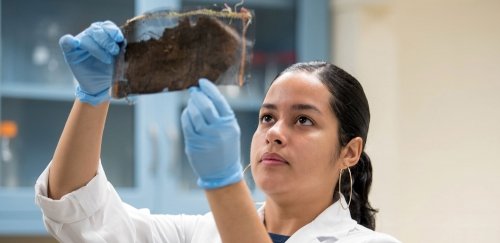
"This research opened my eyes to how much I love biology and specifically ecology.”
Climate scientists say that even if greenhouse gas emissions were cut every year, in every country for half a century, the impacts of climate change would continue for decades – hurricanes, floods and droughts of Biblical proportions.
Ecosystem ecologist Dan Hewins believes that “our approaches now need to be more about how we adapt in the face of climate change.”
This young assistant professor, who joined Rhode Island College’s biology faculty in 2016, has a shy, studied demeanor. He often speaks with his arms folded, eyes lowered, yet is laser-focused on saving an ecosystem that is imploding. Hewins is PI (principal investigator) on a research project that examines the effects of carbon on the atmosphere when land use is changed.
Working with RIC’s Environmental Studies Program and Sustainability Office, Hewins and his three research students are using Rhode Island College’s campus and the Yale Myers Experimental Forest to conduct their field work.
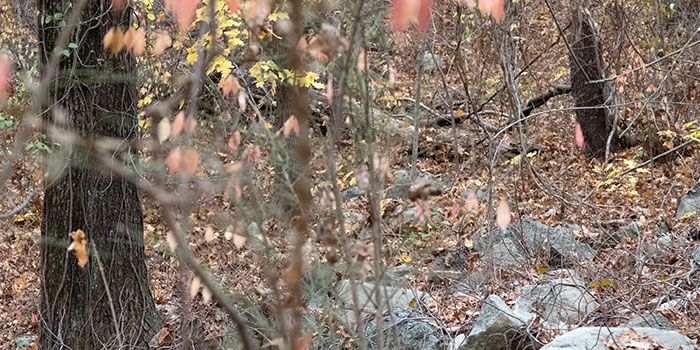
Part of this project involves understanding how much carbon has been lost in forested areas compared to deforested areas. The other part of the project looks at different land uses on campus to find out if certain areas hold more carbon than others and if these areas are reabsorbing or gaining back some of the carbon that was lost. “If we can understand that, then maybe we can promote those types of land uses over others,” Hewins said.
RIC’s campus is a wide range of developed and forested areas, and that’s where you’ll find Hewins’ research student Melanie Howard, taking soil and leaf samples.
She is a senior secondary education major, with a content major in science. Her research partners are Keyla Batista, a senior environmental studies major; and Dan Thifault, a senior management major, with minors in biology and chemistry. Each have their individual projects.
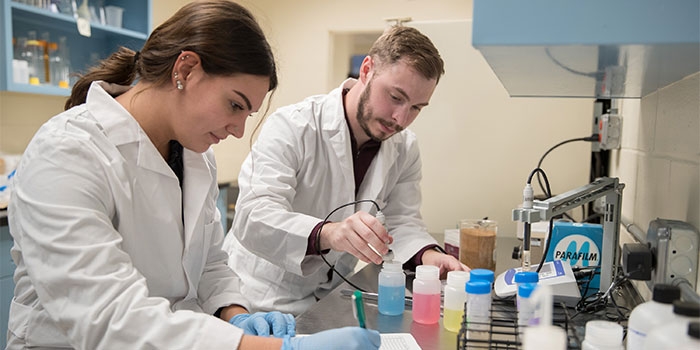
Using a soil core – a metal tube about three feet long and open on both ends, Howard pounds one end of the tube into the ground to extract soil samples. She then takes the samples back to the lab to measure for organic matter, carbon and nitrogen content, and other indicators of environmental health.
The researchers will continue to examine these areas over time, analyzing the differences between soil in undisturbed, forested areas and soil in disturbed, developed areas and record what changes are occurring. Eventually, Hewins will be able to map the campus, pinpointing healthy environments that store carbon and less favorable sites where carbon is being lost.
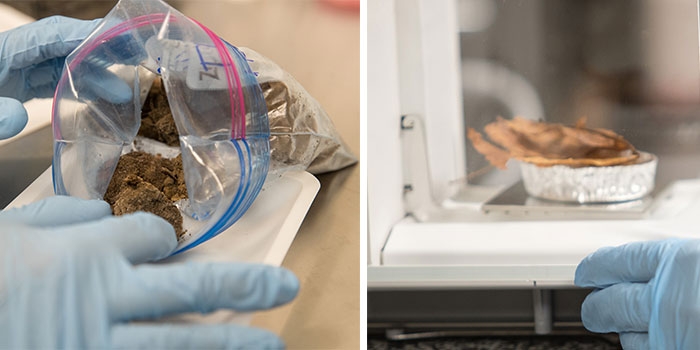
Batista’s project takes her off campus to the Yale Myers Experimental Forest, managed by Yale University’s Department of Environmental Studies and Forestry. There she studies the effects of tree removal on environmental health and forest recovery. This particular forest was cut down 20 years ago; Batista is observing the naturally occurring restoration. Like Howard, she extracts samples and takes them back to the lab for tests.
Thifault’s project keeps him in the lab. He works with the leaf samples Batista brings back from Yale Myers. His project involves examining the enzymes from fungi responsible for the decomposition of leaves.
“Because fungus doesn’t have a digestive system – meaning it doesn’t consume things, break it down in its gut and defecate it – it pushes enzymes out of its cells,” Hewins explained. “The enzymes make contact with a substrate, such as a leaf, and turns the leaf into simple sugars that can be absorbed by the cells for energy. Enzymes also break down carbon and release it into the atmosphere.”
Thifault runs enzyme tests to find out where, why and how carbon cycles in a deforested area. His career interest is in the pharmaceutical industry, which, he says, compliments his lab work.
Thifault transferred to Rhode Island College from a larger, private university and was skeptical about the opportunities for students interested in lab work.
“I was looking for more than the cookbook labs you find in biology classes,” he said. “In those settings you follow steps one through 10 of an assigned experiment and you’re finished. You leave without a greater understanding of what you were doing. In a research lab, you’re asking the question ‘Why?’ or ‘What does this mean?’ I now think more scientifically because I’m working in a lab that requires me to think outside the box and to look at why something happened not just that it happened.”
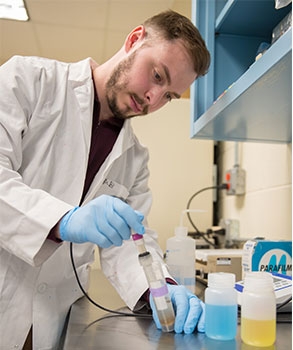
“We also have to be accountable for our own research,” added Howard. “When we get our samples and make our measurements we have to remember that we’re working with a research team who relies on the accuracy of our data.”
Batista agreed. “Everything we do has a domino effect,” she said. “If I mess up my measurements it backfires on Daniel because we’re testing the same sample of leaves even though we’re running different projects.”
“And we care about the work that we do,” added Howard. “We chose to be in an ecology lab with Dr. Hewins. We care about getting good results. This research opened my eyes to how much I love biology and specifically ecology.”
All of these researchers have also become more aware of the affect they have on the environment.
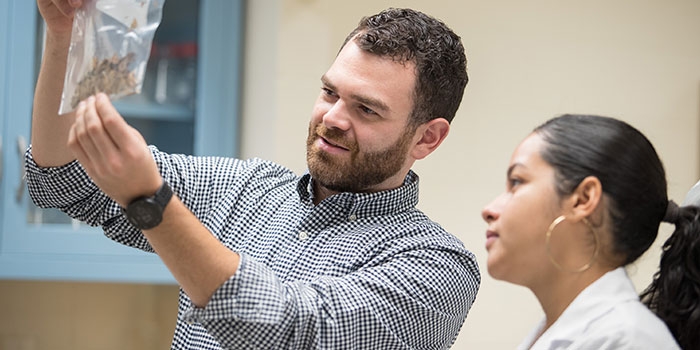
“The impacts of climate change are not on the way, they’re already here,” said Hewins. “I am obviously driven by the potential for a sustainable future. I am buoyed by political agreements aimed at reducing carbon emissions globally and holding the major emitters – the United States and China – accountable. There is also a lot that can happen as a result of developing new strategies and technologies in order to make the future more secure. But to inform improvements, we need the information generated by scientific research.”
Hewins’ lab is also working with researchers at URI as part of the RI EPSCoR collaborative research program. URI is focused on slowing the marine accumulation of greenhouse gases. Its researchers are analyzing sediment and water from Narragansett Bay and will be sending their samples to Hewins’ lab for analysis on the newly acquired elemental analyzer machine purchased with the support of RI EPSCoR and Rhode Island College’s Biology Department. This sophisticated instrument measures the amount of carbon, nitrogen and oxygen in a sample.
RIC’s Department of Biology offers numerous opportunities for laboratory research, led by experts in their field like Hewins. Students benefit from experiential learning, they gain advanced-level lab skills that give them an edge when applying to grad school or med school and they gain invaluable communication skills in writing and presenting their research findings at science conferences.
Click on Part 1, Part 2, Part 4 and Part 5 of this research series.
